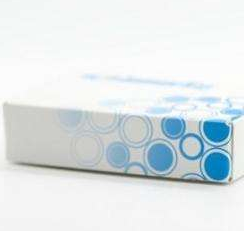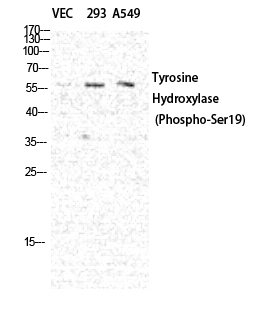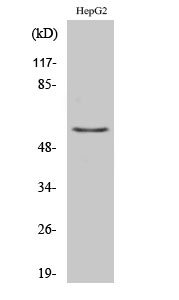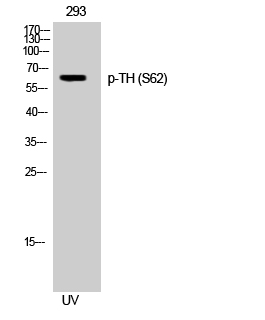Tyrosine Hydroxylase rabbit pAb
- Catalog No.:YT4638
- Applications:WB;IHC;IF;ELISA
- Reactivity:Human;Mouse;Rat
- Target:
- Tyrosine Hydroxylase
- Fields:
- >>Tyrosine metabolism;>>Folate biosynthesis;>>Metabolic pathways;>>Dopaminergic synapse;>>Prolactin signaling pathway;>>Parkinson disease;>>Cocaine addiction;>>Amphetamine addiction;>>Alcoholism
- Gene Name:
- TH
- Protein Name:
- Tyrosine 3-monooxygenase (EC 1.14.16.2) (Tyrosine 3-hydroxylase) (TH),Tyrosine Hydrolase
- Human Gene Id:
- 7054
- Human Swiss Prot No:
- P07101
- Mouse Gene Id:
- 21823
- Mouse Swiss Prot No:
- P24529
- Rat Gene Id:
- 25085
- Rat Swiss Prot No:
- P04177
- Immunogen:
- The antiserum was produced against synthesized peptide derived from human Tyrosine Hydroxylase. AA range:10-59
- Specificity:
- TH Polyclonal Antibody detects endogenous levels of TH protein.
- Formulation:
- Liquid in PBS containing 50% glycerol, 0.5% BSA and 0.02% sodium azide.
- Source:
- Polyclonal, Rabbit,IgG
- Dilution:
- WB 1:500 - 1:2000. IHC 1:100 - 1:300. IF 1:200 - 1:1000. ELISA: 1:10000. Not yet tested in other applications.
- Purification:
- The antibody was affinity-purified from rabbit antiserum by affinity-chromatography using epitope-specific immunogen.
- Concentration:
- 1 mg/ml
- Storage Stability:
- -15°C to -25°C/1 year(Do not lower than -25°C)
- Other Name:
- TH;TYH;Tyrosine 3-monooxygenase;Tyrosine 3-hydroxylase;TH
- Observed Band(KD):
- 56kD
- Background:
- The protein encoded by this gene is involved in the conversion of tyrosine to dopamine. It is the rate-limiting enzyme in the synthesis of catecholamines, hence plays a key role in the physiology of adrenergic neurons. Mutations in this gene have been associated with autosomal recessive Segawa syndrome. Alternatively spliced transcript variants encoding different isoforms have been noted for this gene. [provided by RefSeq, Jul 2008],
- Function:
- catalytic activity:L-tyrosine + tetrahydrobiopterin + O(2) = 3,4-dihydroxy-L-phenylalanine + 4a-hydroxytetrahydrobiopterin.,cofactor:Fe(2+) ion.,disease:Defects in TH are the cause of dystonia DOPA-responsive autosomal recessive (ARDRD) [MIM:605407]; also known as autosomal recessive Segawa syndrome. ARDRD is a form of DOPA-responsive dystonia presenting in infancy or early childhood. Dystonia is defined by the presence of sustained involuntary muscle contractions, often leading to abnormal postures. Some cases of ARDRD present with parkinsonian symptoms in infancy. Unlike all other forms of dystonia, it is an eminently treatable condition, due to a favorable response to L-DOPA.,enzyme regulation:Phosphorylation leads to an increase in the catalytic activity.,function:Plays an important role in the physiology of adrenergic neurons.,online information:Tyrosine hydroxylase entry,pathway:Ca
- Subcellular Location:
- Cytoplasm, perinuclear region . Nucleus . Cell projection, axon . Cytoplasm . Cytoplasmic vesicle, secretory vesicle, synaptic vesicle . When phosphorylated at Ser-19 shows a nuclear distribution and when phosphorylated at Ser-31 as well at Ser-40 shows a cytosolic distribution (By similarity). Expressed in dopaminergic axons and axon terminals. .
- Expression:
- Mainly expressed in the brain and adrenal glands.
A time-course study of microglial activation and dopaminergic neuron loss in the substantia nigra of mice with paraquat-induced Parkinson's disease. FOOD AND CHEMICAL TOXICOLOGY2022 Jun;164:113018. Mouse 1:1000 paws
Soybean isoflavones prevent atrazine-induced neurodegenerative damage by inducing autophagy. ECOTOXICOLOGY AND ENVIRONMENTAL SAFETY Ecotox Environ Safe. 2020 Mar;190:110065 WB Rat 1:1000 substantia nigra,striatum
Atrazine Causes Autophagy- and Apoptosis-Related Neurodegenerative Effects in Dopaminergic Neurons in the Rat Nigrostriatal Dopaminergic System. INTERNATIONAL JOURNAL OF MOLECULAR SCIENCES 2015 Jun 12 WB Rat ventral midbrain
Dysregulation of striatal dopamine D2/D3 receptor-mediated by hypocretin induces depressive behaviors in rats JOURNAL OF AFFECTIVE DISORDERS Kangyu Jin WB Rat striatum
Human neural stem cells promote mitochondrial genesis to alleviate neuronal damage in MPTP-induced cynomolgus monkey models NEUROCHEMISTRY INTERNATIONAL Ying He WB Monkey 1:4000 neural stem cells (NSCs)
- June 19-2018
- WESTERN IMMUNOBLOTTING PROTOCOL
- June 19-2018
- IMMUNOHISTOCHEMISTRY-PARAFFIN PROTOCOL
- June 19-2018
- IMMUNOFLUORESCENCE PROTOCOL
- September 08-2020
- FLOW-CYTOMEYRT-PROTOCOL
- May 20-2022
- Cell-Based ELISA│解您多样本WB检测之困扰
- July 13-2018
- CELL-BASED-ELISA-PROTOCOL-FOR-ACETYL-PROTEIN
- July 13-2018
- CELL-BASED-ELISA-PROTOCOL-FOR-PHOSPHO-PROTEIN
- July 13-2018
- Antibody-FAQs
- Products Images
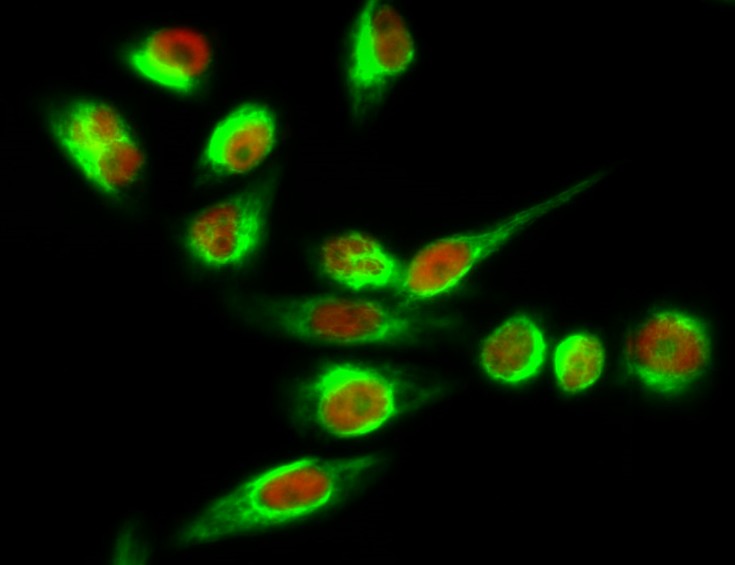
- Immunofluorescence analysis of Hela cell. 1,TH Polyclonal Antibody(red) was diluted at 1:200(4° overnight). GAPDH Monoclonal Antibody(2B8)(green) was diluted at 1:200(4° overnight). 2, Goat Anti Rabbit Alexa Fluor 594 Catalog:RS3611 was diluted at 1:1000(room temperature, 50min). Goat Anti Mouse Alexa Fluor 488 Catalog:RS3208 was diluted at 1:1000(room temperature, 50min).

- Western Blot analysis of various cells using TH Polyclonal Antibody
.jpg)
- Western Blot analysis of 3T3 cells using TH Polyclonal Antibody
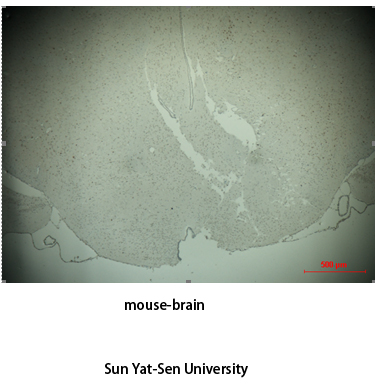
- The picture was kindly provided by our customer
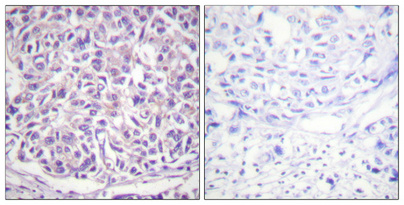
- Immunohistochemical analysis of paraffin-embedded Human breast cancer. Antibody was diluted at 1:100(4° overnight). High-pressure and temperature Tris-EDTA,pH8.0 was used for antigen retrieval. Negetive contrl (right) obtaned from antibody was pre-absorbed by immunogen peptide.

- Immunofluorescence analysis of HUVEC cells, using Tyrosine Hydroxylase Antibody. The picture on the right is blocked with the synthesized peptide.
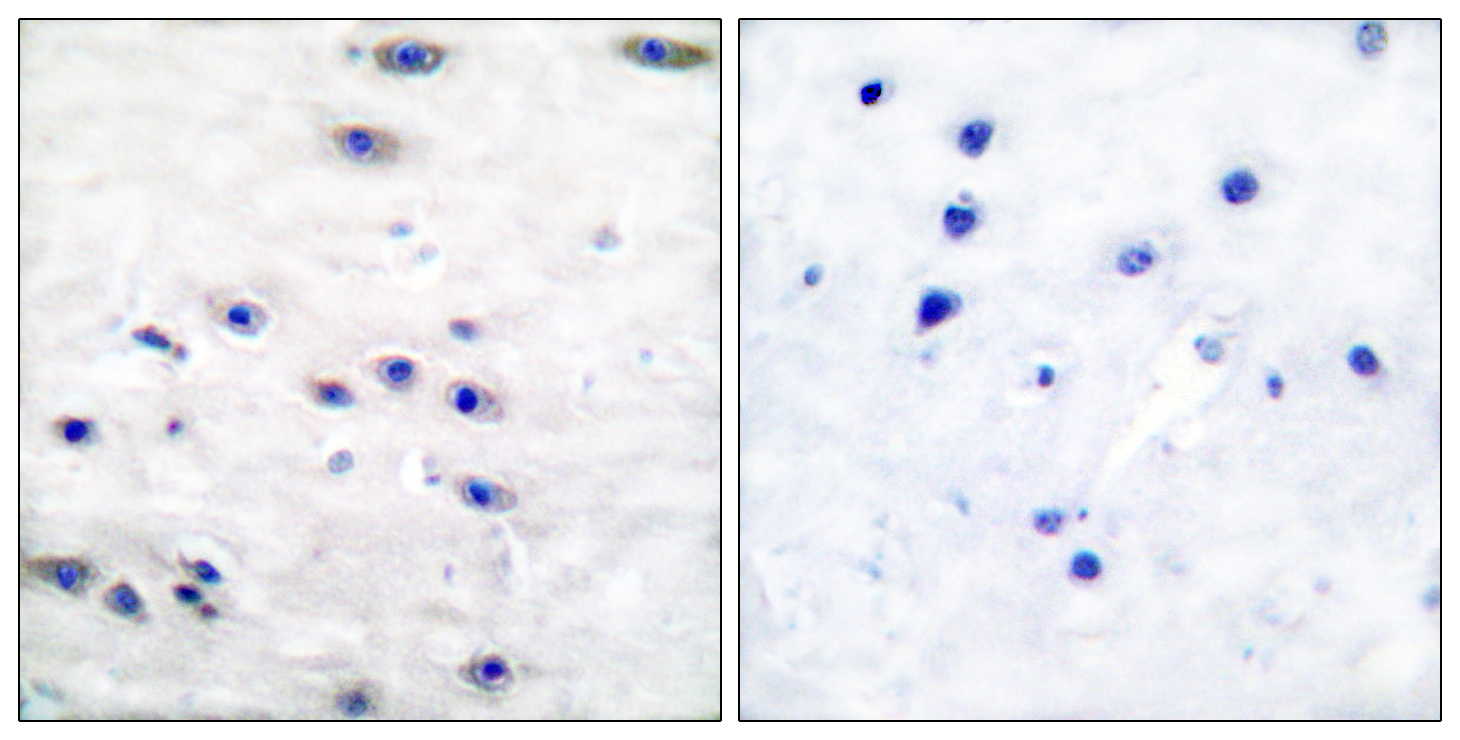
- Immunohistochemistry analysis of paraffin-embedded human brain tissue, using Tyrosine Hydroxylase Antibody. The picture on the right is blocked with the synthesized peptide.

- Western blot analysis of lysates from NIH/3T3/COLO cells, treated with Forskolin 40nM 30', using Tyrosine Hydroxylase Antibody. The lane on the right is blocked with the synthesized peptide.
